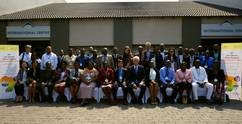
GCED Basic Search Form
Quick Search
You are here
News

The 2017 Sub-Saharan Africa Regional Global Citizenship Education (GCED) Network Meeting under the theme ‘’Identifying Strategies and Solidifying Regional Action for GCED’’ opened on 6 April 2017 in Johannesburg, South Africa.
The meeting that is taking place from 6-7 April 2017 is co-organized by the UNESCO Regional Office for Southern Africa (ROSA) and the Asia-Pacific Centre of Education for International Understanding (APCEIU).
In her remarks, the Deputy Secretary General for South Africa National Commission Ms. Lefika Chetty, highlighted the importance of global citizenship education.
“It is obvious, especially within the overall context of accelerating global peace, that individuals and communities without a satisfactory level of basic education risk becoming marginalized not only within their own society but from the global society too,” she said.
Officially opening the workshop, UNESCO Regional Office for Southern Africa, Director and Representative, Professor Hubert Gijzen said while Global Citizenship might be a relatively new term in African countries, components of GCED such as human rights, citizenship, international relations, peace, conflicts resolution, democracy, and environmental education are not new in the lexicon of Africa.
“In sub-Saharan Africa, UNESCO has been supporting GCED implementation through existing programmes in Education for a culture of peace, sustainable development, human rights, democracy, citizenship and good governance, conflict management, as well as the prevention of violent extremism,” he said.
Prof. Gijzen urged stakeholders in GCED to strengthen partnerships and explore possible synergies to solidify region-wide action for GCED.
“In your discussions, I suggest you also consider engagement with the regional economic communities in Africa (e.g. SADC) as well as the African Union Commission on Education”, he said.
Speaking at the same event, the Director of APCEIU, Dr. Chung Utak thanked the UNESCO Regional Office for Southern Africa (ROSA) for their cooperation in the organization of the meeting, which according to him came at the most opportune time, as participants gathered to take a step further in the realization of GCED by exploring potential collaboration through forming human and institutional network for GCED in Africa.
He urged stakeholders to work together saying fostering global citizenship was everyone’s agenda.
“Fostering global citizenship is not just one of the UN or UNESCO’s agenda. It is every educator’s agenda, every teacher’s agenda. It is everyone’s agenda,” he said.
The meeting has three objectives: (1) To strengthen delivery mechanisms of GCED programmes towards improving impact within the region, and ensuring inclusive participation of stakeholders; (2) To improve the scope and outreach of GCED programmes within the region, addressing the priorities and needs of different sub-regions and groups; and (3) To catalyze political engagement and leadership to ensure commitment of stakeholders.
Capitalizing on this momentum, the meeting is calling upon partners across Africa to solidify action on GCED. It jumpstarted the formation of the Africa Regional GCED Network, would map different GCED programmes in the region, and explore areas of possible collaboration in light of solidifying regional action on GCED.
About 50 representatives from GCED government institutions, Civil Society Organizations, and UNESCO entities from Sub-Saharan Africa and HQ are attending the meeting. Through presentations, panel discussions and group works, they will develop strategies towards the scaling-up of efforts in the global promotion of GCED.
For more information, please contact: c.medel-anonuevo(at)unesco.org or aw.coulibaly(at)unesco.org
